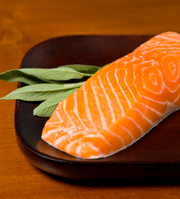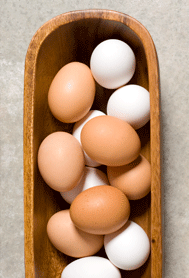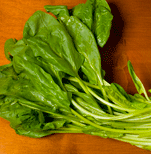
Eating right during pregnancy can be daunting, especially when you have to master a restricted menu and battle morning sickness. Just ask Mara Palcisco of Loveland, Ohio.
When she learned she was pregnant, the systems engineer happily gave up her Tuesday night wine-and-sushi dinners with the girls from work. But while Palcisco’s OB/Gyn provided a list of forbidden foods, the doctor was vague about what she should eat. So Palcisco often doubted her choices. And during the first trimester, constant nausea meant she couldn’t stomach much more than macaroni and cheese.
“I was concerned that I wasn’t getting adequate protein,” says Palcisco. “The smell of most meats made me feel queasy.” Palcisco’s situation isn’t uncommon: Many women find themselves unsure of what to eat while pregnant, surprised that the guidance they receive focuses more on taboos than ideal foods.
So, what foods are best during pregnancy? Which will nourish your growing baby and keep you in top form? Read on and learn about the six foods recommended by registered dietitians and health experts for nourishing you and baby.
Obstetricians give their pregnant patients general guidelines about what to eat, instead of mandatory requirements, because a strict menu wouldn’t accommodate everyone’s tastes, says American College of Obstetricians and Gynecologists member Sharon Phelan, M.D., a professor of maternal fetal medicine at The University of New Mexico in Albuquerque.
But, as a general rule, pregnant women should consume 300 extra calories per day, including ample protein, folic acid, iron, and calcium. Dairy products should be eaten frequently, while foods such as sushi and unpasteurized cheese are off-limits, because they could harm the baby. Moms-to-be should also go out of their way to eat five servings of fruits and vegetables daily to get necessary vitamins, minerals, and antioxidants, plus fiber to keep the digestive tract running smoothly.
The bottom line: “Eat a diet that’s full of nutrient-dense whole foods, like fruits, vegetables, lean proteins, whole grains, and low-fat dairy,” says American Dietetic Association (ADA) spokesperson Melinda Johnson, M.S., R.D, a registered dietitian in Phoenix. “This way, most of what you put in your mouth contains vitamins, minerals, and other nutrients.”
You can boost your intake of healthy compounds by incorporating these seven super-charged pregnancy foods into your diet. It’s easy: Add just one item per day, and eat it on its own, combined with another super-charged food, or along with other pregnancy-friendly ingredients such as lean meats and whole grains.
Lentils
Americans only eat about half as much fiber as they should, according to the ADA. During pregnancy, high-fiber foods such as beans can help prevent constipation. “This is true especially for the third trimester,” says obstetrician Hope Ricciotti, M.D., co-author of I’m Pregnant! Now What Do I Eat?
, who explains that as the uterus enlarges, a pregnant woman’s digestion becomes more difficult.
And when it comes to beans, lentils are a choice you can count on: They’re high in fiber, protein, iron, and folic acid, providing you with a number of essential nutrients in one small, nutty-tasting package. And to save time, you can look for canned beans—just rinse them before serving because they’re packed with salt. Or pick up hulled or decorticated lentils: These are orange in color and can be prepared more quickly. Once cooked, toss lentils into salads and soups, or mash them with chopped garlic, lemon juice, and olive oil to create a hummus-inspired dip suggests Karen Gurwitz, author of The Well-Rounded Pregnancy Cookbook.
Walnuts
All nuts are rich in protein and heart-healthy fat, so they’re a great snack option. But walnuts stand out because they’re also a good source of omega-3 fatty acids, which have been shown to boost your baby’s brain and eye development and may reduce your risk of depression.
“They’re the only nut that contains omega-3s,”says ADA spokesperson Suzanne Farrell, M.S., R.D., a registered dietitian in Denver. It takes little effort to add walnuts to your diet. Toss them into your morning cereal. Add them to salads. For a deeper flavor, toast them first, says Gurwitz, she suggests sprinkling the walnuts over yogurt, rice pilaf, and even cooked spinach—another super-charged pregnancy food—to add crunch.
Yogurt
Although you don’t need more calcium while pregnant, you do need to be sure you’re getting the recommended daily amount. Most women get only 700 of the required daily 1,000 milligrams, according to March of Dimes. Skimping on calcium-rich foods during pregnancy can be harmful to your health. If you don’t get enough through your diet, your body will take calcium from your bones to support your baby’s growing bones and teeth. This could lead to osteoporosis later in life, or even cause problems sooner; some research from the World Health Organization suggests that calcium deficiency may be a factor in preeclampsia, a late-pregnancy condition that can lead to early delivery of the baby.
Stay on top of your calcium needs with yogurt: It’s far more versatile than milk and can actually help your digestion if you choose brands with active cultures. “Some brands contain probiotics and acidophilus,” Farrell says. “Research shows these help keep you regular. Since constipation is a common side effect of pregnancy, yogurt can help.”
A one-cup serving of yogurt also provides nearly half of your daily calcium requirements; select low-fat varieties to avoid unnecessary extra calories. Make yogurt parfaits with cut fruit and granola for breakfast, lunch, or a midday snack. Or whip up a wholesome yogurt-based smoothie, adding fresh or frozen fruit and a tablespoon or two of ground flaxseed—a fiber-rich ingredient that’s also good for digestion and a source of omega-3s. One caveat: Because of flaxseed’s phytoestrogen content, Katie Jirele, R.D., L.D., a licensed dietitian at the Mayo Clinic in Rochester, MN, recommends not overdoing it with that ingredient.
 Salmon
Salmon
Salmon is a good source of vitamin D, which helps the body process calcium. A recent University of Pittsburgh study found that most pregnant women have vitamin D deficiencies, even those who take prenatal vitamins. Two seafood meals a week may help you consume enough of this important nutrient.
Salmon has one of the lowest mercury levels among fish, making it a safer seafood option. Like other fish, it’s a good source of the DHA (docosahexaenoic acid) and omega-3 fatty acids that are so good for baby’s brain development. “Omega-3s and DHA are difficult to get in our food supply,” says Johnson, “so fresh or canned salmon is a top contender for pregnant women.” Choose wild salmon over farmed whenever possible; it’s likely to contain fewer pesticides and up to 35 percent more omega-3s, according to research by the Environmental Working Group in Washington, D.C.
Another potential benefit to eating salmon during pregnancy: If you have asthma, it may reduce your baby’s risk of developing asthma as well, according to a study from The University of Southern California.
If you’re not a chef, don’t worry: Salmon fillets are easy to prepare. Drizzle them with olive oil and lemon juice, then bake at 350 degrees for 10 to 12 minutes, or broil for 4 minutes per side. For an even faster meal, make a sandwich with frozen salmon patties. And canned salmon is a good substitute for tuna in salads, plus it contains small, edible bones that provide a calcium boost.
 Eggs
Eggs
Scrambled eggs may have been one of the first dishes you learned how to cook. Now, easy prep makes protein-rich eggs an ideal food to depend on during pregnancy.
“Eggs have vitamin B12, zinc, vitamin D, and more,” says Farrell. “And a lot of eggs today have omega-3 fatty acids. Hens are given flaxseed in their feed, which is a natural way of fortifying the eggs with omega-3s and DHA,” she adds. These nutrients are beneficial to your health and important to fetal brain development.
For variety try omelettes and frittatas, the Italian version that’s baked and unfolded. Or hard-boil eggs to eat on their own or sliced atop salads. If you find it difficult to eat eggs, the latter two options are the most palatable because they’re firm.
“Get into the habit of boiling six eggs when you bring them home from the grocery store,” says Gurwitz, who is also the founder of Mothers & Menus, an organic food delivery service for new moms in New York City. “Doing this ahead of time is great for when you’re too tired to prepare anything but you’re reaching into the fridge, contemplating what to eat.”
Blueberries
People have been going crazy about this humble little fruit for years because of its antioxidant properties, but blueberries have a special benefit for pregnant women: Some research has shown that they contain high levels of proanthocyanidins, which can help prevent and treat urinary tract infections.
“Berries are powerhouses of nutrients,” Johnson says, “and blueberries’ link to lowering the risk of bladder infection make them a smart food to grab during pregnancy.” Because your uterus will press on your bladder more and more throughout your pregnancy, making it difficult to empty, you’re at higher risk for this infection.
When fresh blueberries are available, sprinkle them onto yogurt or breakfast cereal, add them to pancake or muffin batter, and blend them into fruit smoothies. The rest of the year, use frozen blueberries in recipes.
 Spinach
Spinach
You’ve always known that greens are good for you. During pregnancy, rely on dark, leafy greens such as spinach and kale. They’re excellent sources of folic acid, which prevents neural-tube defects in baby, and iron, which you’ll need because your blood volume will increase by up to 50 percent during pregnancy, according to Farrell. And without ample iron, you could become anemic.
Spinach is extremely versatile. Make salads with bagged baby spinach—a great time-saver—or substitute larger leaves for lettuce in wraps. And you can sauté fresh or frozen spinach with garlic and olive oil for a tasty side dish. Just be sure to wash all fresh spinach before serving or cooking, even if the bags say the leaves are pre-washed.
Foods to forget
Some of these foods can harm your developing baby, while others contain empty calories that can cause unnecessary weight gain.
- Whole milk: You need calcium, not extra fat and calories. “Go for skim milk,” Johnson says. “It’s got all the nutrition of whole milk but fewer calories and no fat.”
- Swordfish: The Food and Drug Administration recommends that all pregnant women avoid fish that could be high in mercury—namely swordfish, shark, and king mackerel—because mercury can damage the baby’s developing nervous system.
- Sports drinks: You may feel sluggish, but don’t seek energy drinks for a boost. Pregnant women don’t need electrolytes, caffeine, or sugar—and some drinks contain vitamins, herbs, and stimulants that could have unknown effects on the baby. “If your body is tired, it needs sleep,” Johnson says. Get enough rest and hydrate with water.
- Candy: Satisfy your sweet tooth occasionally, but don’t make a daily habit of snacking on sugary treats. “Candy takes the place of that third fruit serving for some women,” Farrell says. “Eat the good stuff first, then indulge.”
- Bologna: Two good reasons to shun this lunch meat: You’ll avoid passing carcinogenic nitrates to your baby, and you won’t risk getting listeria. “Unlike other food poisonings, which don’t affect the baby,” Ricciotti says, “listeria can cause miscarriage and early labor.” Listeria, a bacteria, is also the reason for the ban on unpasteurized soft cheeses.
- Fried foods: Greasy, fatty foods are full of empty calories, and they can cause nausea and indigestion. “Digestive transit time is slower when you’re pregnant, so fried foods sit heavier on the stomach,” Phelan says.


Thanks for this great message, it is fantastic I am looking forward to hear more from you, because the message is very very helpful, thanks so much.
A well balanced diet with lots of fruits and veggies and lean proteins are still good for you and your growing baby, foods to avoid is fish high in mercury, too much caffeine, alcohol, you should heat up lunch meats, undercooked/ raw meats, and unpasteurized foods. During the first trimester you do not need any extra calories, during your second and third you need to eat an extra 300 calories a day. When I was pregnant with my second child I was determined to avoid getting preeclampsia again and followed the brewers diet for pregnant women. My first was 9lbs 7ozs 6 days early and my second was 6lbs 8ozs two days past the due date.